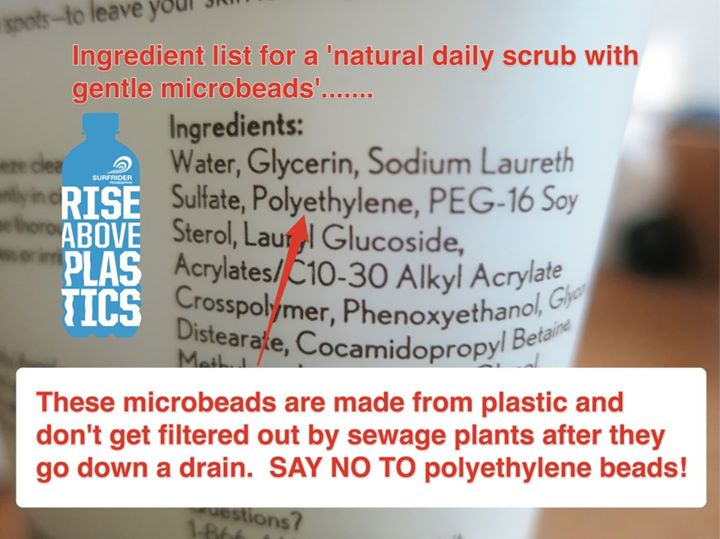
Plastic Microbeads: Tiny Plastics that Pose a Big Problem
By Dan DeBaunShare
Discarded plastics – in the form of plastic bags, plastic packaging, and plastic consumer goods – are notorious environmental pollutants that degrade natural systems, kill wildlife, and ultimately pose a health risk to humans too. While plastic bags and other plastics are widely acknowledged as being extremely important environmental pollutants, tiny plastic microbeads are a lesser known evil, that are now being acknowledged as problematic.
Plastic microbeads are minute plastic particles that are added to hundreds, if not thousands, of beauty products sold all over the world, including certain shower gels, facial and body scrubs, and even some brands of toothpaste. These microscopic plastic beads flow down the plughole of your shower, bath or bathroom basin, and enter the sewage system. While drinking water treatment facilities are equipped with specialized filtration systems that can remove microbeads, wastewater treatment facilities do not have the capacity to filter these tiny particulates from the wastewater as it enters the plant, and being plastics, by their very nature they persist in the treated effluent when it is discharged into a river. These microbeads are carried suspended in the river water and are finally released into the ocean, where they are contributing to an ever growing problem of plastic marine debris. Wildlife in both freshwater and marine ecosystems absorb or consume microbeads, which are then passed up the food chain when a predator consumes prey that has ingested or absorbed these tiny plastic particles. Considering that humans ultimately sit at the top of marine and freshwater food pyramids, it stands to reason that we too are more than likely absorbing plastic microbeads when we consume contaminated fish, shellfish or waterfowl.
Plastic microbeads do not break down in the environment and consequently persist in both freshwater lakes and the oceans. Now that this problem has been acknowledged, environmental groups are putting pressure on manufacturers of personal care products to remove plastic microbeads from their products. While many manufacturers have taken steps to replace microbeads with environmentally friendly alternatives consisting of natural materials that are readily biodegradable, such as ground peach pips or walnut shells, the phasing out process is somewhat slow. Consequently, there are still personal care products on store shelves that contain plastic microbeads, which are adding to the plastic soup in our waterways and oceans.
Now, if like me, you are concerned that you are contributing to the problem by using your favorite exfoliating shower gel or facial scrub, you can now download a smartphone App that can alert you to whether a product contains plastic microbeads or not, via a simple traffic light interface that allows you to see the products eco-friendly status at a glance. The App was originally developed by two Dutch NGOs – the North Sea Foundation and the Plastic Soup Foundation – to allow consumers in Holland to check whether personal care products contained plastic microbeads by scanning the barcodes. In 2013 the United Nations Environment Programme (UNEP) together with Fauna & Flora, an environmental NGO based in the UK, got onboard to develop the App further so that it could be used internationally to help address the problem.
How to use the App
Download the Beat the Microbead App
- Once you have downloaded the App, you need to select your country.
- Use your smartphone to scan the barcode of the selected personal care product.
- The App reads the product's barcode, and will indicate whether the product contains microbeads via a color coded output as follows:
- Red: The product contains plastic microbeads.
- Orange: The product does still contain plastic microbeads, however the supplier has pledged to replace these with an eco-friendly alternative within a specified period.
- Green: The product does not contain plastic microbeads.
The Beat the Microbead App gives consumers the power to make environmentally sound choices when purchasing personal care products. Consumer boycotting of products that contain plastic microbeads will force manufacturers that are unwilling to replace microbeads with biodegradable alternatives to think otherwise.
Source: Surfrider Foundation
-
Regular price $234.00 USDRegular priceUnit price / per
-
Regular price $327.00 USDRegular priceUnit price / per
-
Regular price From $367.00 USDRegular priceUnit price / per
-
Regular price From $408.00 USDRegular priceUnit price / per
-
Regular price From $451.00 USDRegular priceUnit price / per
-
Regular price From $478.00 USDRegular priceUnit price / per
-
Regular price $332.50 USDRegular priceUnit price / per
$350.00 USDSale price $332.50 USDSale

Dan DeBaun is the owner and operator of Big Berkey Water Filters. Prior to Berkey, Dan was an asset manager for a major telecommunications company. He graduated from Rutgers with an undergraduate degree in industrial engineering, followed by an MBA in finance from Rutgers as well. Dan enjoys biohacking, exercising, meditation, beach life, and spending time with family and friends.
~ The Owner of Big Berkey Water Filters
















